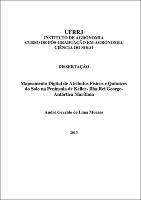Use este identificador para citar ou linkar para este item:
http://rima.ufrrj.br/jspui/handle/20.500.14407/10542| Tipo do documento: | Dissertação |
| Título: | Mapeamento digital de atributos físicos e químicos do solo na Península de Keller - Ilha Rei George - Antártica Marítima |
| Título(s) alternativo(s): | Digital mapping of physical and chemical attributes of soils in theKeller peninsula –King George Island - Maritime Antarctica |
| Autor(es): | Moraes, André Geraldo de Lima |
| Orientador(a): | Francelino, Márcio Rocha |
| Primeiro coorientador: | Pereira, Marcos Gervasio |
| Primeiro membro da banca: | Francelino, Márcio Rocha |
| Segundo membro da banca: | Silva, Leonardo Duarte Batista da |
| Terceiro membro da banca: | Carvalho Junior, Waldir de |
| Palavras-chave: | Krigagem com deriva externa;Covariáveis ambientais;Ambiente periglacia;Kriging with external drift;Environmental co-variables;Periglacial environment |
| Área(s) do CNPq: | Agronomia |
| Idioma: | por |
| Data do documento: | 27-dez-2013 |
| Editor: | Universidade Federal Rural do Rio de Janeiro |
| Sigla da instituição: | UFRRJ |
| Departamento: | Instituto de Agronomia |
| Programa: | Programa de Pós-Graduação em Agronomia - Ciência do Solo |
| Citação: | MORAES, André Geraldo de Lima. Mapeamento digital de atributos físicos e químicos do solo na Península de Keller - Ilha Rei George - Antártica Marítima. 2013. 52 f. Dissertação (Mestrado em Agronomia - Ciência do Solo). Instituto de Agronomia, Departamento de Solos, Universidade Federal Rural do Rio de Janeiro, Seropédica, 2013. |
| Resumo: | Este trabalho teve como objetivo avaliar diferentes métodos de mapeamento digital para a predição de atributos físicos e químicos de solos, e fornecer mapas e dados que possam subsidiar o entendimento dos principais processos envolvidos na pedogênese e desenvolvimento da paisagem, através do uso de atributos de terreno, na península de Keller, Ilha Rei George, Antártica Marítima. Para tanto foram coletadas amostras de solo em 55 pontos, em forma grade semirregular, de maneira que cobrisse grande parte da área livre de gelo da península. As amostras foram coletadas nas profundidades de 0-5, 5-10 e 10-30 cm. Foram quantificados pH, carbono orgânico total (COT), Ca, Mg, Al, H+Al, P, K, Na, soma de bases (S), saturação de bases (V%) e porcentagem de terra fina. Somente foram espacializados os atributos que possuíam distribuição normal dos dados naturalmente, estes foram: pH, S, COT (5-10 cm) e porcentagem de terra fina. Foram testados três métodos de espacialização: regressão linear múltipla (RLM), krigagem ordinária (KO) e krigagem com deriva externa (KDE). Para a utilização nos modelos de RLM e KDE foram geradas 12 covariáveis de terreno geradas a partir de um modelo digital de elevação (MDE) de resolução de 5 m. Para a escolha das covariáveis foi utilizado o procedimento stepwise, utilizando o critério de Akaike, e posterior analise de correlação entre as covariáveis selecionadas, para evitar efeito de multicolinearidade. As mesmas covariáveis utilizadas na RLM foram utilizadas na KDE na predição das respectivas variáveis. Os resultados mostraram que a utilização de covariáveis pode ajudar no entendimento dos processos pedogenéticos atuantes na área e na espacialização de alguns atributos físicos e químicos das áreas na península Keller. O método de KO mostrou-se mais eficiente na espacialização do atributo pH. Enquanto que a KDE mostrou-se mais eficiente na espacialização dos atributos soma de bases e carbono orgânico total. E a RLM foi o método mais eficiente na espacialização do atributo percentual de terra fina, segundo os índices avaliados. |
| Abstract: | This study aimed to evaluate different methods of digital mapping for the prediction of physical and chemical properties of soils, and to provide maps and data tosupport the analyses of the main processes involved in the pedogenesis and landscape development, through the use of land attributes in the Keller peninsula, King George Island, Maritime Antarctica. Soil samples were collected at 55 points in a semi regular grid fashion, set to cover much of the ice-free area of the peninsula. Samples were collected at depths of 0-5, 5-10 and 10-30 cm. The variables pH, total organic carbon (TOC), Ca, Mg, Al, H + Al, P, K, Na, sum of bases (S), base saturation (V%), and percentage of fine earth were quantified. Only the attributes that showed data normal distribution naturally were spatialized, and they were the following: pH, S, TOC (5-10 cm), and fine earth percentage. Three methods of spatialization were tested: multiple linear regression (MLR), ordinary kriging (OK) and kriging with external drift (KDE). For usage in models of RLM and KDE, 12 covariates were generated from a digital elevation model (DEM) with resolution of 5 m. To choosethe covariates, it was applieda stepwise procedure, using the Akaike criterion, with the further analysis of correlation between selected covariates,in order to avoid the effect of multicollinearity. The same covariates used in the MLR were used in the KED, to predict the respective variables. The results showed that the use of covariates may help in the understanding of pedogenic processes in the area and the spatial distribution of some physical and chemical attributes of lands in the Keller Peninsula. The OK method was more efficient at the spatialization of the attribute pH.On the other hand, the KDE method was more efficient in spatializing the attributes sum of bases and total organic carbon. And the MLR method was the most efficient for interpolation of the fine earth percentage attribute, according to the indices evaluated. |
| URI: | https://rima.ufrrj.br/jspui/handle/20.500.14407/10542 |
| Aparece nas coleções: | Mestrado em Agronomia - Ciência do Solo |
Se for cadastrado no RIMA, poderá receber informações por email.
Se ainda não tem uma conta, cadastre-se aqui!
Arquivos associados a este item:
| Arquivo | Descrição | Tamanho | Formato | |
|---|---|---|---|---|
| 2013 - André Geraldo de Lima Moraes.pdf | Documento principal | 5,5 MB | Adobe PDF |  Abrir |
Os itens no repositório estão protegidos por copyright, com todos os direitos reservados, salvo quando é indicado o contrário.

